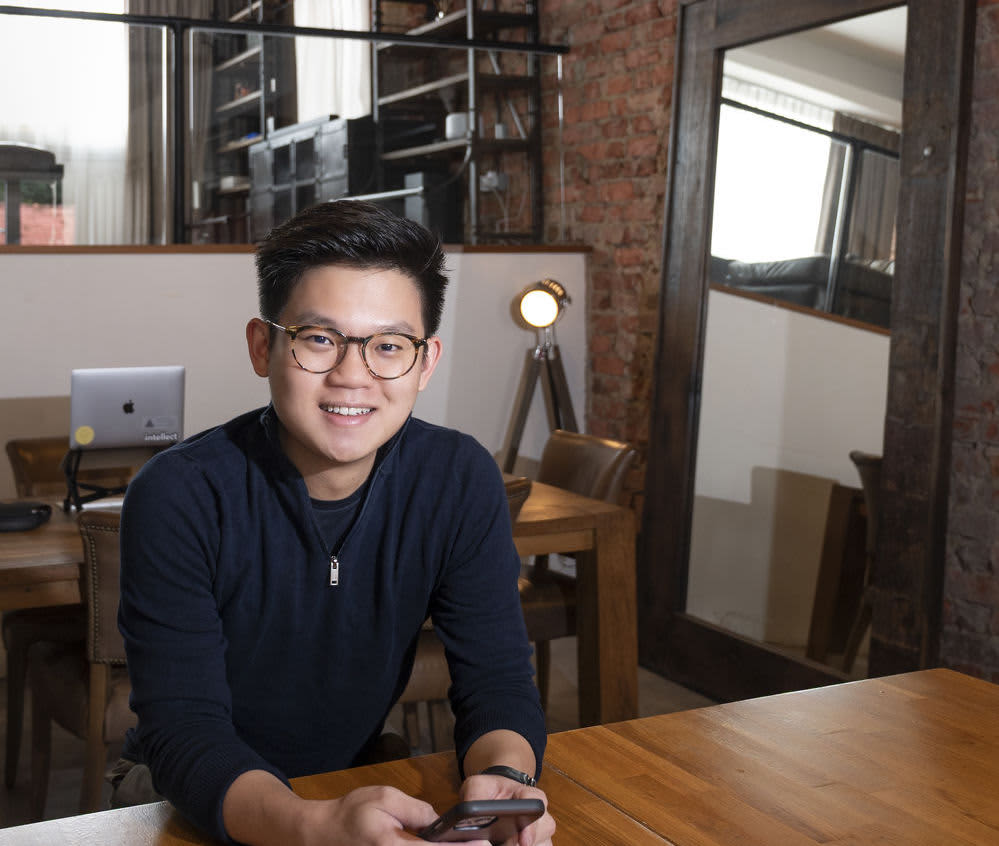
Theodoric Chew, 28, co-founded mental health startup Intellect in 2019.
Theodoric Chew suffers from panic attacks and an anxiety disorder. But, he’s never allowed it to stop him — in fact, it’s inspired him to help others struggling with the same.
Today, he is the 28-year-old CEO and co-founder of mental health startup, Intellect, that’s raised over $20 million.
“We’re not just an app, we are not just a distress helpline,” Chew told CNBC Make It.
Intellect is an “integrated mental health-care system that aims to tackle any level of risk and need,” he said.
“It could be as acute and critical as a crisis call [where] you need to speak to someone on the ground … to as small as wanting to be more confident,” said the Singaporean CEO.
Founded in 2019, the company’s services range from mental health screening tools and self-care programs, to consultations with clinicians and in-person clinics. Intellect has over 200 employees across 12 countries and says it has served over 3 million people as of 2024.
High school dropout
From drop-shipping to ad arbitrage, Chew started experimenting with various internet businesses throughout his teenage years.
“A lot of this started during my secondary school years (ages 12 to 16) … I was already working on a couple of my own things at that point,” said Chew, who attended Raffles Institution, a well-known and prestigious school in Singapore.
At age 16, Chew decided to drop out of high school.
“Looking long term, I really didn’t see myself going the path of … being a top student, going to a top university, or being a top lawyer or doctor,” he said.
But what he clearly knew was that he wanted to spend more time building things. “For me, it’s by actually working in startups rather than, you know, the theory of it.”
Chew caught a couple of “lucky breaks” after dropping out, he said.
By age 20, he had already founded and successfully exited his first startup, Existgreat, a self-help content platform that featured interviews with the likes of American entrepreneur and speaker, Gary Vaynerchuk.
Following the acquisition, Chew went on to work at a couple of startups, where he gained more experience.
Inspired by his own journey
Recounting his own journey with mental health, Chew said: “I got my first panic attack when I was 16.”
“That’s when, actually, I realized something seemed a bit wrong,” he added.
Chew went on to seek the help of a therapist, and was later diagnosed with an anxiety disorder.
Through his own experience, the Singapore-native found a glaring problem: while mental health issues are prevalent in Asia, the space is largely underserved.
Theodoric Chew served National Service in Singapore for 2 years.
Courtesy of Theodoric Chew
According to World Health Organization research, “almost one billion people globally live with mental health conditions of which approximately 260 million people live in the WHO South-East Asia Region.”
In addition, about 82% of workers in Asia have a “medium to high” risk for developing mental health issues, according to a report by insurance broker Aon and Telus Health.
“For me, a few things were starting to piece together,” said Chew. “It’s not news that Asia has one of the highest mental health crisis rates, but stigma is super strong.”
Naturally, there are cultural and historical nuances that shape how Asians tend to treat their own mental health. They tend to be less inclined to share their feelings openly, explained Chew.
“That trickles into a broader, societal focus of health care as well. A lot of investment and innovation goes into secondary, primary and tertiary care — we see hospitals being built,” but the mental health-care market lacks maturity, Chew said.
I don’t think I’m the smartest, I don’t think I’m the most capable but … I am naively ambitious, and I think that has served me reasonably well.
Theodoric Chew
Co-founder and CEO, Intellect
Chew saw that his friends were also struggling with their own mental health needs, and they didn’t know where to begin.
There was “quite practically very little to no innovation happening in the mental health space in Asia,” at that time, he added.
“Not a lot has been done, but the issues are very real,” said Chew. “So, that gave us a very good starting point: how do we address this issue of helping people to get started?”
And so, Intellect was born.
Expect challenges
“I think in the very initial stages, any founder needs to be a bit delusional,” said Chew. “I don’t think I’m the smartest, I don’t think I’m the most capable but … I am naively ambitious, and I think that has served me reasonably well,” he said.
Throughout his journey so far, Chew has been distinctly aware of his strengths, and more importantly, where he is lacking. By knowing where his weaknesses lie, Chew outsources certain skills and jobs to employees.
“As a founder, particularly a young founder, you need to be very aware of where you’re not good at, rather than where you’re good at, and be open minded to learn,” he said. “Our entire executive team is much more experienced and senior than I am.”
Intellect now offers in-person clinic visits.
Courtesy of Theororic Chew
Along with being “naively ambitious” and being highly self-aware, the key to Chew’s success has been three-fold: Having an innate interest in building things, having the drive to experiment with ideas, and expecting challenges along the way.
However, the reality is that “it never gets super straightforward or easy for anyone, so there’s always that inertia to overcome,” Chew said. “I think [expecting] that to be part of the journey is also a very important thing.”
Shaping the face of mental health in Asia
Looking ahead, Chew wants to expand Intellect beyond Asia, with the goal of being the “global leader in hyperlocal mental health care,” he said.
“The journey has been very exciting and rewarding … I didn’t even expect how quickly we could actually serve a very glaring need.”
When asked about how he handles the anxiety and stress of being a startup founder, he said he works on regulating his emotions and stress, and tries to compartmentalize.
“Parking work at work sometimes is really required,” he said.
“I think having my own personal downtime in space is important for me to function for the long haul.”
Want to make extra money outside of your day job? Sign up for CNBC’s new online course How to Earn Passive Income Online to learn about common passive income streams, tips to get started and real-life success stories.
Plus, sign up for CNBC Make It’s newsletter to get tips and tricks for success at work, with money and in life.

